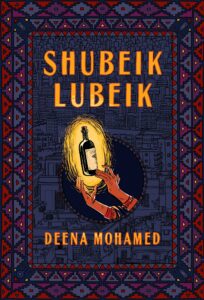
I did not grow up reading comic books, so perhaps it’s no surprise that as an adult, I haven’t gotten into graphic novels. I read Watchmen in college and that might be it…ever. But the English translation of Shubeik Lubeik by Deena Mohamed came with enough hype from people that don’t normally read graphic novels that I decided to give it a try, and I’m glad I did.
Shubeik Lubeik takes place in Cairo, in a world where magic wishes are real, are sold commercially, and are heavily regulated by various governments. The story is broken into three sections, each starring the owners of three first-class wishes—powerful, expensive, and rarely seen in the kind of neighborhood where most of the book is set. While the lives of the three characters do intersect, the main thrust of the novel is the individual struggles facing the three characters as they determine how best to use the wishes.
I’ve read so few graphic novels that I don’t have much point of comparison with the artwork, but I certainly found it compelling, in a way that communicated a lot about the characters and setting and generally made for a smooth reading experience that made me want to keep turning the pages. The graphic format certainly allows some flexibility that a standard novel lacks, and Shubeik Lubeik used this flexibility to great effect, with a depressed character repeatedly graphing their mental states and with interstitial infographics on the history and usage of wishes—my particular favorite being a short list of regional slang terms for third-class wishes.
And while there may not be one overarching plot, I found the three constituent stories individually all quite interesting. The best executed and most compelling of the bunch was the second, featuring a college student from an extremely wealthy family struggling through deep depression. I’ve already mentioned the graphs, which were a nice touch, but so many aspects of this storyline just felt so perfectly done, from how the character’s understanding of their own privilege only worsens their mental state to them confusing a short-term feeling of fulfillment for a whole and complete cure.
The first story doesn’t go quite as deep into the character, but it does plenty to flesh out the world, with a whole lot to say about abuse of power. It may not be the star of the book, but it serves very well setting the table for the stories to come. And there are some touching character moments, even if it’s not a character study in the same way as the story that follows.
The final piece of the novel presents an utterly compelling character dilemma, though the one where I was least satisfied with the resolution. I’m a big fan of devout religious characters in fantasy, and the lead of the third section is deeply concerned with living up to the moral precepts of Islam, including a strict prohibition on the use of wishes. There’s strong reasoning behind this prohibition, and it dovetails wonderfully with some of the little worldbuilding bits about the debates on whether or not wishes are sentient. But instead of digging into that element, the author handwaves it away, instead using the storyline to comment on colonial propaganda. Don’t get me wrong, colonial propaganda is also a topic that dovetails very nicely with other elements of the story, but choosing this storyline means closing the door on another that had shown early signs of promise.
But even if I was disappointed with the resolution of the religious dilemma, I still found the third character fascinating, and his story doubly so for including an extended flashback to the heart-wrenching circumstances behind one of his acquaintances using a wish of her own. This fourth story is told in such depth that its subject almost feels like a fourth protagonist, and it’s in real contention for the best in the book.
While the three individual sections mostly stand alone, cameos by characters from other parts help make the overall story feel cohesive, and the way the ending calls back to some of the very earliest pages helps send the book out on a satisfying note. Overall, Shubeik Lubeik was something of a revelation to a reader who doesn’t read many graphic novels at all. All three segments had extremely strong elements—with the second in particular being a true standout—and there was enough connective tissue to make the story as a whole feel cohesive. I have my complaints, but the art, worldbuilding, and characters were all exceptional. I’m probably not going to become a regular with graphic novels, but if this is the level of quality on display, I’m certainly not going to avoid them either.
Recommended if you like: graphic novels, non-Western settings, character-driven stories.
Can I use it for Bingo? It’s hard mode for POC Author if you use the date of translation (otherwise, it’s normal mode). It’s also hard mode for Character with a Disability if you’re counting mental illness (which I think is well within the spirit of the square), and it contains Reference Materials and Multiple POVs.
Overall rating: 18 of Tar Vol’s 20. Five stars on Goodreads.
